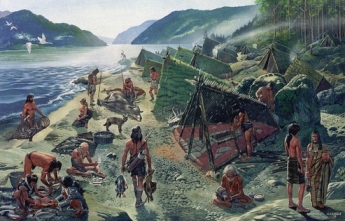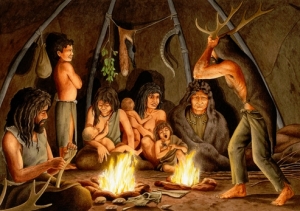After my post on raw milk versus pasteurized milk went online, one of my Facebook friends questioned whether or not dairy was even Paleo? Which made me realize that I had not even addressed that issue. Dairy is one of those things that has become a bit of a sore subject for Paleo people. You know how you don’t talk about hunting when you are hanging out with a bunch of vegans because it’s just not worth the fight. Yeah, that’s kind of how some Paleo people get about dairy. One of the other reasons that I chose to call myself the Primal Otter instead of the Paleo Otter, because although, I started Paleo, I definitely have fallen into a more ancestral lifestyle. It really drives me a bit crazy to get into these conversations of “Is this thing Paleo?” because I think that question loses the big picture of the whole “Paleo” intent. Which is to eat in a way that is best for you and for Nature. At least, that’s my take, others may definitely differ.
Dr. Loren Cordain is known as the father of the Paleo Diet in a lot of ways. He wrote The Paleo Diet book first and is looked at as a solid voice in the community. And Dr. Cordain does not believe that milk should be consumed. His reasons are cited in this interview and his reasons are why a lot of people should not and do not drink milk. Milk can be a huge allergy trigger for some people. Between the casein and the lactose, a fair amount of people (numbers are given around 65%) are unable to digest milk. He also cites the drugs that are given to cows (they are) and references studies that show an increase in insulin for people who consume milk, although I am unsure if that includes all sources of milk or just store bought, mass produced milk. And since it is called the Paleo Diet, ingesting milk is not something the nomads of the Paleolithic era did. Drinking milk past breast feeding did not start until, we believe, less than 10,000 years ago which is a very short amount of time in the human evolution.
But let’s be totally honest folks. First off, there is no way that we as modern human beings can completely mimic the Paleolithic diet. We just can’t. Produce has evolved. Animals have changed. The world has changed. Does that mean that we should throw healthy, whole eating and the concepts of the Paleo diet out the window? No. But I also think that we need to look at everything bearing in mind that we are not necessarily Paleolithic people.
Now on to the people who are the big voices in the pro milk category. While technically, not a Paleo group, the Weston A. Price Foundation is an amazing resource for good, natural eating. They differ from Paleo in ways that I personally think are not important (although, you’ll see people on both sides bad mouthing the other side) because they think you should eat grains but you should sprout them first. And they are supporters of dairy products. Their similarities on the other hand are endless. They support local, grass fed meat, eating animal organs, cod liver oil, organic produce, consuming good, healthy fats, and the list goes on and on. Again, though, we tend to get lost in those little unimportant issues and lose the big picture.
The Weston A. Price Foundation is a huge proponent of consuming dairy and keep in mind that we are referring to raw, grass fed milk not the store stuff. A few different sources that give you a general idea on their viewpoints of raw milk can be found here and here. This article also directly addresses Dr. Loren Cordain’s claims that milk contains growth factors that cause cancer. As that article points out, there is a lack of a direct effect between milk consumption and cancer.
So where do the other names in Paleo come down on milk consumption? I think Mark’s Daily Apple takes a good stand about milk. He lists the good and the bad, and chooses not to totally take a stand, although you can tell he leans toward not consuming it at all. Abel James of the Fat Burning Man talks about his heavy cream, and grass fed butter he loves to put in his coffee. Angelo Coppela of Humans are not Broken and of Latest in Paleo tends to say that he does Paleo/Weston A. Price. Sarah Ballantyne of The Paleo Mom comes down on the side of choosing not consume dairy herself but recommends caution for others. It’s also important to keep in mind the background these particular bloggers come from too. Abel James and Angelo Coppela both are more the type who’ve tested it, found great results, and recommend that other people test it too. Sarah Ballantyne suffers from an autoimmune disorder and is Celiac disease so because of the similarities between gluten and casein, she can’t drink milk even if she wanted to.
As I’ve stated previously, I choose to drink milk. And other than occasionally getting some cheese on something when I go out to eat, I only consume my dairy from a local source because I think that’s important. I’ve tried it both ways. I’ve done totally dairy free, occasional dairy, or just raw dairy, and I feel the very best when it’s just raw dairy. I find my digestion is better, I’ve actually noticed less bloating. I’m satiated for longer periods of time and even though with the milk and yogurt I’m probably taking in more calories on a daily basis, I have not had any weight gain.
It really sounds like a cop out but it genuinely has to be a personal test. How do you personally feel when you eat grass fed, raw dairy? As it should be with all foods that are “Paleo” or “Not Paleo”. It shouldn’t be necessarily about whether or not the cavemen were eating it (because I highly doubt cavemen were baking coconut flour cookies in their caves) but how you feel when you eat. Experiment with foods objectively, keep a journal, listen to your body. That’s the true way to find the optimal diet.


